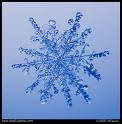Hello everyone.
So imagine you have this idea, this story, that fills you with joy, that you truly feel in you heart of hearts and soul of souls is important, that you need to share. So instead of going the usual write-a-query-letter-find-an-agent-contact-publishers-yadayadayada crap, you instead try it the 21st century way. You post it on a blog, you throw it up on a couple of related online forums, you mass e-mail it out to everyone you have contact info for, telling them to forward it on virally, saying "hey, you do it for dumb jokes, do it for this!" You tell everyone "give me feedback, don't just say 'good job', be critical!"
Then you wait.
And wait.
And wait.
On your blog, your friends and family pretty much all say "good job" (with a few exceptions, thanks Sam and Pete). The forums get a few vanilla replies the first day or two, and then it gets buried under all the people talking about crystal readings and relationship problems and how they've been meditating for a whole week now and nothing's happening and all the crap that you outgrew a decade ago. That alignment, that synchronicity that you were so sure would happen doesn't. And all this time that wonderful high, that rightness you felt when the story first flew out of your mind, down your fingers, and onto the screen easier and faster and better than anything you've ever written in you life, starts to fade. You get sick, have a hard time kicking it. You here more news about old friends going through hard times. You think about the past, and all the dear people you miss, and wonder why you've had such a hard time connecting with anyone out here at the ass end of nowhere. Basically, the peak fades, and now it's the hard scrabble to keep the plateau as high as possible, and every little banal thing seems to be working together against you.
Frustration seems to be the greatest obstacle to gaining any kind of enlightenment. Look at Jesus, for example. How many times did he get upset because his disciples missed the points of his parables? How often did he lose his temper with the authorities? How many of those tears of blood wept at Gethsemane were not tears of fear, but tears of frustration at having so little time left and so much more he wished to share? Quite a few, I think. When the Buddha held the lotus blossom up in silence in front of 1250 of his followers, and only 1 understood why he did it, did he get frustrated? Probably. And I am nothing compared to these. I am, as John the Baptizer said, not even worthy to help one of them on with their sandals. They are graduate students working on their doctorates, I am in kindergarten still trying to learn how to tie my shoes and count past 10. But this does not mean I cannot try to help my little brothers and sisters to stack up their blocks or draw circles. And if my siblings would rather scribble than draw circles, or knock towers down than build them up, am I allowed to get frustrated? Yes. But are they also allowed to scribble and knock things down? Yes, and that's the hard thing to remember. Eventually, I will find others who will want to play my games, who will also want to learn to tie shoes and count past 10, and then we shall play wonderful games of make-believe together. Until then, I just have to keep my temper.
CS

